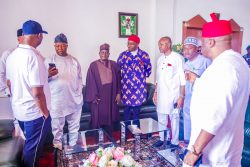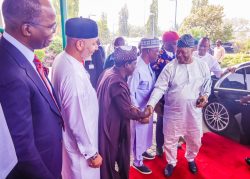As President Bola Tinubu sets up a committee to decide a new minimum wage for Nigerian civil servants, it would seem worrisome that the country’s rising inflation, currently at 28.92%, is yet to be tamed.
Economists believe the implementation of a substantial new minimum wage will hurt the economy with more than 50% inflation. This is just as the naira exchange rate to international currencies widens daily.
President Tinubu is touting a minimum wage that will be satisfactory to all, which leaves many in wonderment what that would be.
According to the World Bank, People living below the poverty line don’t have enough to meet their basic needs. Countries typically define national poverty lines, using the lines of a group of the poorest countries to define the international extreme poverty line of $1.90 per day.
Currently, at the rate of N1,520/$, a N30,000 monthly wage is worth 66 cents per day, which is far below the poverty line.
If the committee set up to recommend a new minimum wage, does it by the World Bank’s standard, that means the next minimum wage must be at least N84,474, going by the current exchange rate to the dollar.
Considering the fact that the civil service across the states and the federal government is at least 1.7 million, an addition of at least N50,000 per civil servant would mean infusing N85 billion into the economy every month, or N1.02 trillion every year.
Without value addition in terms of productivity, the government will resort to printing or borrowing money endlessly to meet its recurrent expenditure, which would in turn cause massive demand-pull inflation.
The President said his administration hopes to surpass the basic Social Protection Floor for all Nigerian workers, considering the sustainable payment capacity of each tier of government for employers or businesses.
Veteran stockbroker and lecturer at Adeleke University, Professor Tayo Bello, told Nairametrics that increasing wages in Nigeria during a period of rising inflation could initially provide relief to workers by improving their purchasing power and standard of living. He said higher wages may contribute to a boost in consumer spending, potentially stimulating economic activity.
- “However, the downside is that this wage increase might exacerbate inflationary pressures. As businesses face higher labor costs, they may pass on these expenses to consumers through increased prices for goods and services. This, in turn, could create a feedback loop, with rising wages fueling further inflation,” he said.
Dr. Tosin Olaleye, an economic affairs analyst, also told Nairametrics that small and medium-sized enterprises (SMEs), which make up more than 96% of businesses in Nigeria, may be particularly vulnerable to increased wage costs, potentially leading to layoffs or business closures.
He said this could negatively impact employment levels and overall economic productivity. He also said depending on how well the minimum wage is managed, the exercise could increase the rate of inflation by as much as 50%
Special Advisor to President Bola Tinubu on PEBEC and Investment, Dr. Jumoke Oduwole, revealed that 39.7 million MSMEs in Nigeria today account for roughly 96% of businesses and 88% of jobs.
Financial economist at Ebonyi State University, Dr. Nelson Nkwo, noted that the government may need to implement complementary policies to manage the potential negative effects of wage increases, such as tightening monetary policy to control inflation and providing support to affected businesses through targeted interventions.
- He said striking a balance between addressing the legitimate demands for higher wages and managing inflationary pressures is crucial for achieving sustainable economic growth.” Policymakers must carefully consider the broader economic implications and adopt a comprehensive approach to ensure a harmonious and stable economic environment,” he stated.
Drawing strength from the outcome of the Udoji Commission in 1972, Nkwo said, “I fear we may have another bout of uncontrollable inflation, maybe above 50%, if the wage increase is not properly managed.”
Also speaking, the chief executive of Anthill Concepts Limited, Dr. Emeka Okengwu, stated that it is more appropriate to be talking about living wage because living wage takes into consideration what minimum wage does not.
He said a living wage would contain three major factors, including energy cost, which would include electricity and transportation, education, and the cost of food and healthcare.
He caveated that this cannot be achieved without productivity because it cannot be accomplished with imported goods and services such as energy and health facilities.
He also cautioned that it’s only a small percentage of Nigerians that are in paid employment and a smaller percentage of Nigerians in the civil service.
According to the Anker Reference Value Update Rural Nigeria 2023, the Living Income for 2023 is NGN 232,948 (USD 383). This update takes into account the amount of inflation to mid-2023 for the country since mid-2020.
Accumulated inflation in this period was 68.0%. “Without accounting for inflation, the living income estimated in 2020 would not be sufficient for families to have a basic but decent standard of living in 2023, because the purchasing power of the living income would have decreased.
The Coordinator of the Independent Shareholders Association of Nigeria, Moses Igbrude, and Professor Tayo Bello agreed that increasing the minimum wage will not be the ultimate solution to the underlying problem laborers face.
Speaking separately, they cited that the government needs to improve the country’s productivity, especially in the agriculture and manufacturing sectors.
Igbrude noted that an increase in the minimum wage at this time would reduce the value of the increase in no time because there are no measures in place to curb the rising inflation and the sliding value of the naira, which is another major cause of inflation.
[Nairametrics]


